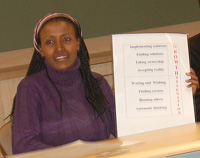By Joel Magalnick, Editor, JTNews
Though the story of Operation Moses, the mass airlifts that took Ethiopian Jews from Addis Ababa to a new homeland in Israel, has been hailed as a major success in its planning and execution, what has happened once they got there has not always been so positive. The vast majority of Ethiopians that made it to the Jewish State have been absorbed, but stuck in their own ghettoes, out of sight of most native Israelis.
Poverty is the norm, alcohol and drug use are widespread, and even the traditional family structure has, in many cases, disintegrated: Older Ethiopians brought over have not learned Hebrew and are therefore unable to communicate outside of their immediate environs. Their children, who have been better assimilated into the culture, would rather not look at what they consider their parents’ backward culture, and refuse to help out. At the same time, the younger generations are not receiving the education they need to excel in the fast-moving, high-tech Israeli society.
So it’s a welcome opportunity to find an Ethiopian Jew that has overcome these barriers and found a measure of success in her adopted country. Bat-El Shmueli is one of those Ethiopians. Shmueli spent a few days in Seattle at the end of January during a tour of U.S. cities to tell her story and talk about what’s happening with Israel’s Ethiopian immigrants.
Shmueli’s family, as well as the other Jews in her village in Ethiopia, had to practice their religion in secret, she says — other villagers believed the fallacies of Jews “eating children” and “drinking their blood.”
“My dad said he didn’t want this life,” Shmueli says.
So he felt lucky when he was able to move his family — Shmueli and her four siblings — to Addis Ababa, where they stayed for about two weeks before being airlifted. After a stop in Rome, they arrived in Israel.
“My daddy, who was 80, he cried,” Shmueli says. “I’d never seen him cry.”
But when the Ethiopian immigrants first came to Jerusalem, which they expected to look like it had “in Moses’ time,” they were in for a rude awakening: “It’s so fast, so modern,” Shmueli says. “They lost themselves.”
Shmueli says she was determined to become a part of Israeli culture and rise above the poverty so many of her fellow countrymen found themselves in. She had spent eight months in a Hebrew-language ulpan after her arrival at the age of 11 and attended a boarding school, where she was sponsored by a family that helped her to pay for incidentals. Catching up to her fellow students, most of whom were native Hebrew speakers, was difficult, she says, but she managed to do it. Upon graduation, Shmueli joined the Israeli Defense Forces, where she served in a unit comparable to the Navy SEALS, all the while working to help support her family after her father’s death.
Still, from her humble beginnings to her military service, “I felt 100 percent Israeli,” Shmueli says.
Feeling Israeli didn’t make her feel Jewish, however. Upon her release from the IDF, she spent some time in New York — “I said after two weeks, ‘I’m not going to find myself,’” she says — and then to Los Angeles, where she met several Jews and became a part of that community.
“Now I had the answers,” she says, and after a year she moved back to Israel, where she married a man she had met during her army service. She earned degrees in Jewish Studies and Teaching from the University of Haifa, and was also a dancer in the famed Escesta Ethiopian troupe.
She is now 29 and has two children. The family lives in an artists’ village called Hod, located near Haifa, where her husband is a sculptor.
But during her dance career and through her 20s, Shmueli reconnected to the Ethiopian culture she had tried to escape from as a teen, and found a people that had in many ways been left behind.
“For most of the Ethiopian community, it’s hard,” she says. “Parents need children, the children say, ‘leave me alone.’
“Most of them live in a bad area, and most of them blame the government,” she adds. “We see a lot of drugs, alcohol, bad things.”
Some of the better performing students do go to university, while some of the younger Ethiopians have tried to make their situation better through learning programs that include arts, music and dance.
“They have a chance to build themselves,” Shmueli says.
Programs have also been initiated to help with the older generations, for things including such simple acts as self-expression — Shmueli’s own parents had never said “I love you” to her, she says.
“It’s easy for [my mother] to tell me in Hebrew,” she says. “In Amharic they don’t have these words.”
So to do her part to help her community, Shmueli began to travel to places like Seattle to tell her story and to try to give American Jews more insight into what Ethiopian Israelis face each day in their new home.
The contact, she says, “has given us a lot of optimism.”
